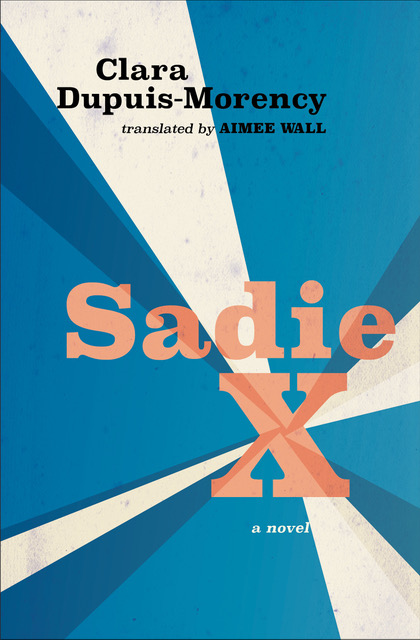Fall 2023 Fiction Preview: Sadie X

Today’s Fall Fiction Preview features Sadie X by Clara Dupuis-Morency, translated by Aimee Wall!
Having followed the brilliant virologist Régnier from Montreal to Marseille many years ago, Sadie now works as a researcher in a lab, spending most of her time among microscopic creatures who teach her about life as a parasite. By day, she pushes the limits of her understanding alongside Régnier, who taught her that to study viruses, she must think infectiously, allow herself to be contaminated by dangerous ideas. By night, Sadie loses herself in bars, music, drugs, sensuality. Until she gets a call from the past that lures her back across the Atlantic.
When her estranged father tells her that a bizarre virus has been found in his hospital, Sadie returns to Montreal and her family, and all the unexpected changes time has wrought, to solve this new puzzle. Soon she realizes that the person she thought she was—someone who can leave everything behind—no longer exists. What is left for her instead is sinking into the unknown to find out what happens when ideas come to life.
This is a deeply inventive and singular novel about the power of metamorphosis and symbiosis. Combining the cerebral and the sensual, Sadie X explores humanity’s relationship to the rest of the world, and the role of rationale—and its limits in our multilayered, regenerative existences.
“After winning just about everyone over with her first novel, Mère d’invention, Clara Dupuis-Morency is back with Sadie X, an equally ambitious work set in the world of virus research. This ‘novel of unlearning,’ which feels like an astonishing mix of Maylis de Kerangal and Virginie Despentes, is a high-wire act that could not be more timely,” writes Chantal Guy, La Presse.
We’re happy to share an introduction from Clara Dupuis-Morency!
In addition, we’ve selected an excerpt from the novel to share with you today. Sadie X will be released on October 10, 2023, and is available for pre-order from our online shop or from your local independent bookstore.

Sadie is not a philosopher. Back when she was still studying philosophy, when she still thought it was her calling, one of her professors spoke about what he called the “three humiliations of Humanity.” The first wrought by Nicolaus Copernicus, who dethroned the Earth from its place at the centre of the Universe, showing it was nothing more than a tiny speck in a world-system. The second by Charles Darwin, who spoke of our animal ancestor, destroying humanity’s claim to a separate and superior status in creation. And the third by Sigmund Freud, who demoted the human “I” from its position as master in its own home, reducing it to dependency on the most scanty information concerning all that goes on unconsciously in its psychic life.
With this, Sadie’s professor, an eccentric, broke down the walls of the discipline. It was rather unorthodox to venture into such scientific terrain within the Faculty of Philosophy. He emphasized the importance of each of these revolutions in knowledge, fomented by the controversial work of each of these men, and underlined the resistance they faced. He repeated the word several times, hu-mil-i-A-tion, stressing the fourth syllable, building excitement until they could look at all of History stretching out before them, the chain formed by these summits, and identify these singular moments in which thought had brought about radical change, these moments he called “invidious, stubborn, ungrateful to the past,” moments that, through the cataclysm created by this new vision, gave shape to the future.
After this slightly unusual course, Sadie never again heard anyone speak of the scientific revolution in the philosophy department, she never again heard talk of science until the day, a few years later, she met François Régnier. She’d signed up for a seminar outside of her program. Régnier was a physician working as a researcher in France. During the semester in which he was at the Université francophone de la Montagne on a fellowship, he was appointed head of his first laboratory in Marseille. Régnier studied viruses.
Clara Dupuis-Morency was born in Quebec City and lives in Montreal. Her first novel, Mère d’invention, was a finalist for Prix des libraires du Québec, Prix du CALQ–Work by an Emerging Artist, and for the France-Québec prize, Les Rendez-vous du premier roman. She also works as a translator and is the mother of twin girls.
Newfoundland-native Aimee Wall is a writer and translator. Her essays, short fiction, and criticism have appeared in numerous publications, including Maisonneuve, Matrix Magazine, the Montreal Review of Books, and Lemon Hound. Wall’s translations include Vickie Gendreau’s novels Testament (2016), and Drama Queens (2019), and Sports and Pastimes by Jean-Philippe Baril Guérard (2017). Her acclaimed debut novel, We, Jane was nominated for nine literary prizes including the Amazon Canada First Novel Award, the BMO Winterset Award, the ReLit Award for Fiction, and the Scotiabank Giller Prize longlist. Wall lives in Montreal.

